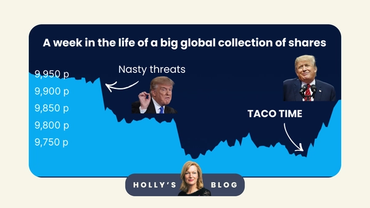Spin the Wheel causes carnage
By Holly Mackay, Founder & CEO
4 April, 2025

Shockwaves are still reverberating from so-called Liberation Day on Wednesday, as Trump channeled his inner Michael McIntyre and announced new tariffs, spinning the wheel with a theatrical display, wiping over 2.5 TRILLION off US shares. He has certainly liberated a few thousand quid off my ISAs and pension.
Yesterday, the S&P 500 fell by nearly 5% and the tech-heavy Nasdaq fell by nearly 6% - its worst day since coronavirus spooked markets globally. Apple’s market value fell by nearly 10%, losing more than $300 billion in one day. As I write, European shares are falling and overnight Japan, Vietnam and South Korea all suffered losses.
This is one gloomy gameshow
The probability of a US recession has shot up, and confidence has crashed. We have just witnessed an astonishingly arrogant act of self-harm in the States.
Anything imported will cost more. US businesses will have to re-examine everything they buy and try to source domestic alternatives. But you can’t turn your supply chain upside down in a matter of months. This will bite.
And Apple is a good example of the pain that many businesses will feel. About 90% of its products are made in China. Tariffs on goods made in China appear to be set at 54% although the detail is still a little sketchy and we don’t yet know if Apple will be given any exemptions. If not, the question becomes this – who pays for the cost of the tariffs? Does the importer swallow it and accept lower profits? Or do they recoup this via higher prices? If, as is probable, it is the US consumer, then no prizes for guessing what happens to inflation there. It goes up.
Higher prices lead to lower sales which is why corporate leaders are gloomy and recession is on everyone’s lips. “Never before has an hour of Presidential rhetoric cost so many people so much,”former Treasury Secretary Lawrence Summers posted. “The best estimate of the loss from tariff policy is now close to $30 trillion or $300,000 per family of four.” Former Trump VP and now spurned enemy, Mike Pence, wrote that “The Trump Tariff Tax is the largest peacetime tax hike in U.S. history.”
How are markets responding?
At times like this, investors seek out less risky assets. Such as US Treasury bonds (effectively very boring and stable loans investors make to the US Government, which pay out an income stream and also inch up in value over time). If I worked for an investment bank, I would write that we are seeing “a flight to quality” as people piled into bonds yesterday. If you are interested in bonds, we’ve updated a Beginner’s Guide here and it’s worth a read – especially for higher rate taxpayers who are sitting on a bit of cash.
Gold is normally a safe haven when the world goes mad, but not even gold could withstand yesterday’s blow. Why? When stock prices fall dramatically, some investors who have borrowed money to buy shares need to raise money quickly to pay their ‘margin calls’.
Let’s say I had borrowed £100 and bought £200 of Apple shares. The lender is happy for my loan to be half the cost of the shares, which gives them comfort that I could repay the loan by selling the shares if I had to. If the value of those shares fell to £180, then the lender would get the heebie-jeebies and say, hang on, I want to reduce the loan to just £90 please. So give me a tenner. This is a ‘margin call’.
Some investors have needed to raise the money for margin calls by selling gold, so this dip is probably a liquidity-driven move, not a reflection of gold’s long-term value. We saw this same pattern in the early stages of Covid-19, when gold prices dropped sharply as markets crashed. But that stumble was short-lived. Once the very short-term need for cash eased, then the appeal of gold shot up again and I don’t think it will be different this time.
What to expect?
There’s a big global guessing game about intent. And whilst this continues, don’t expect the nerves to ease. The main thing stock markets really really hate is uncertainty.
So far Donald Trump’s approach to bargaining seems to be like a very erratic parent who threatens to remove an iPad for a week, only then to agree to remove it for ‘just’ one day. Leaving the child feeling as though they got a reasonable deal. Will there be more exemptions? What will the final tariffs look like in practice? Will there be a softening of position?
For now, I expect continued poor sentiment to weigh on markets. So the million dollar question becomes - is this is long-term pullback and will markets remain low for long as we trundle towards recession? Or will the perceived threats lessen, will some things recover and so is this a mid-term buying opportunity? Events such as these do make the case for ‘pound cost averaging’ – in other words, setting up a regular monthly direct debit into investments, so smoothing out the price you buy at.
For those with long-term timeframes, I do know that buying into the S&P 500 this week is better than buying into the S&P 500 one month ago. As always, trying to define risk is absolutely pointless without having an associated timeframe. If you are setting up a Junior ISA for a baby, and have 18 years up your sleeve, today is not a bad day at all to buy into stock markets. If you have a house deposit to scramble together in a year, it’s a very bad idea and cash should be your friend. If you’re interested in long-term views and potential, see what the managers of Mid Wynd investment trust have to say.
For most of us, a direct debit for a monthly contribution into a global tracker or diversified investment product, using our ISAs, and then putting in our earplugs as various presidential gameshows come and go, is a boring yet very good approach.
If you were planning a last-minute contribution into a Stocks and Shares ISA before the end of the tax year this weekend, but have been put off by falling markets, just remember you can pay your cash in and leave it sitting there in cash, just inside the Stocks and Shares ISA product, and make your investment decision later. Or if you’re just considering your options, you could consider a virtual trading account to have a play and learn the ropes with zero risk.
Have a good weekend everyone and try not to worry about the flashing seas of red on your money apps! This too shall pass. Make like the penguins on the Heard and McDonald Islands whose feathers seem remarkably unruffled by the 10% tariff on them. Waddle, waddle.
Holly
Post a comment:
This is an open discussion and does not represent the views of Boring Money. We want our communities to be welcoming and helpful. Spam, personal attacks and offensive language will not be tolerated. Posts may be deleted and repeat offenders blocked at our discretion.






